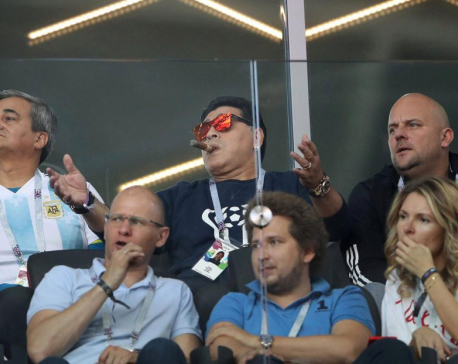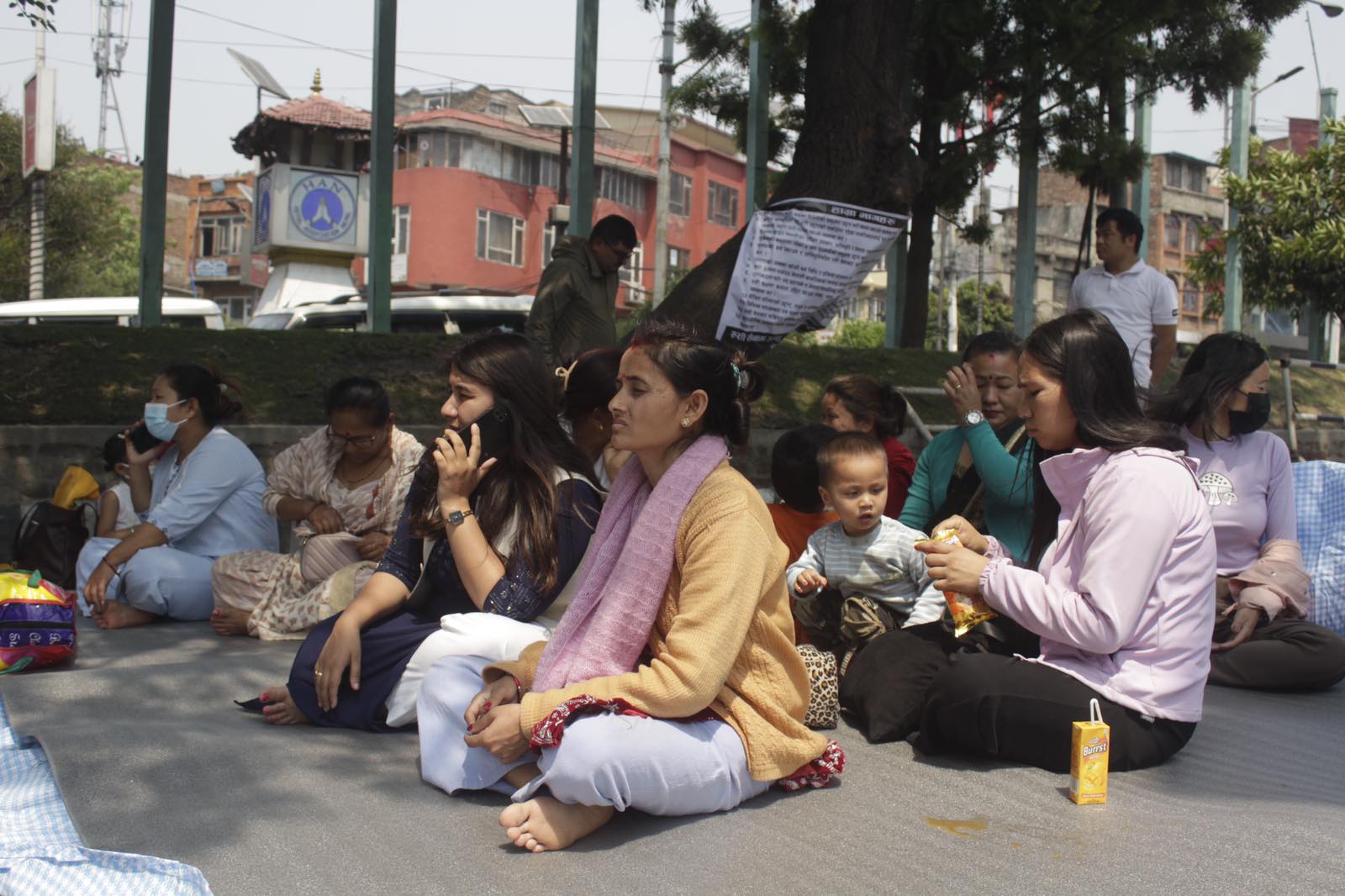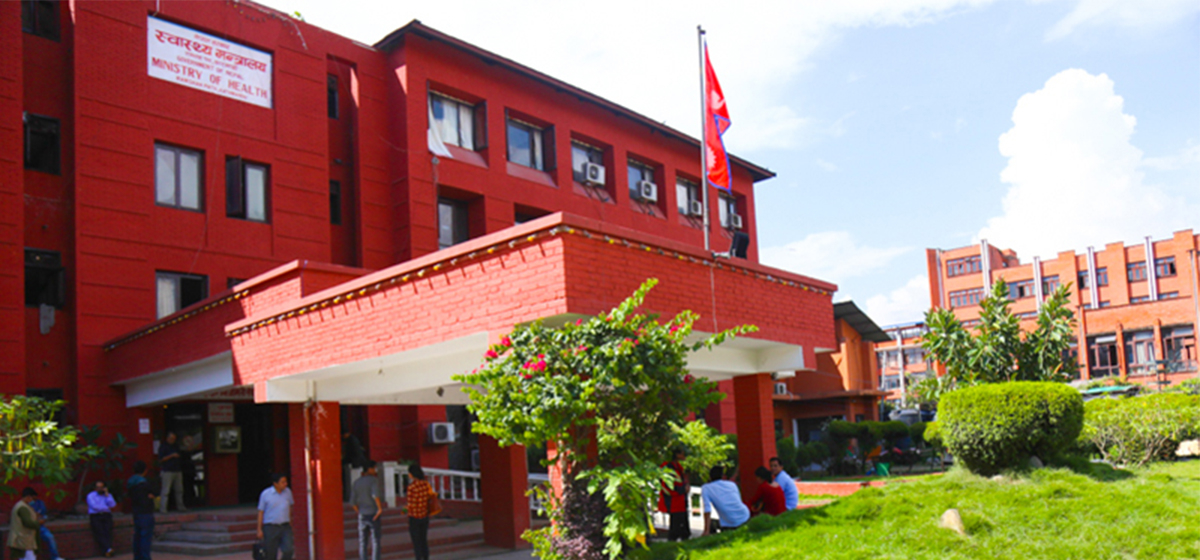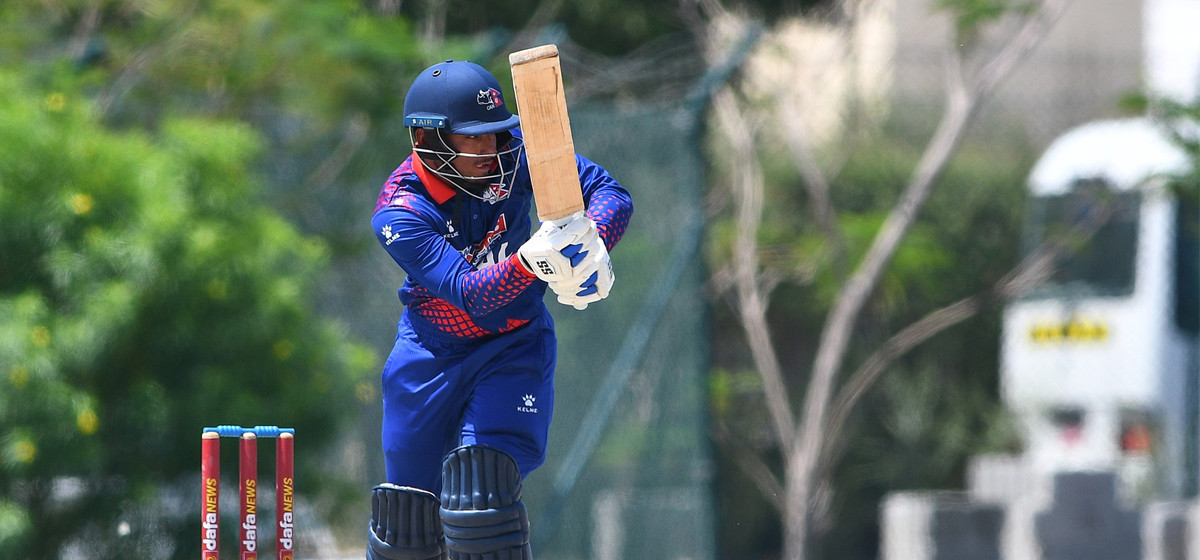
OR
Namita Gokhale on writing and managing the world’s largest literature festival
Published On: May 31, 2019 10:26 AM NPT By: Shiwani Neupane

Namita Gokhale, 63, has written 19 books, both fiction and non fiction. She is also a grandmother, publisher, and one of the founding directors of the world’s largest literature festival, the Jaipur Literature Festival, which has seen a record-breaking number of 250 to 300 thousand book lovers from all over the world.
Gokhale’s latest book Things to Leave Behind won multiple awards including the Valley of Words (VoW) award for English Fiction 2018, the Sushila Devi literature award and the first Centenary National Award for Literature by the Asam Sahitya Sabha.
Shiwani Neupane caught up with Gokhale during her recent trip to Kathmandu.
Can you tell us about your connection to the Himalayas and Nepal in particular? What brings you here?
What brings me to Nepal this time is a temple. In the last three months, I have had two grandchildren, and I’d told myself that when these kids come into the world I’d visit two temples and Banglamukhi in Lalitpur is one of them.
I’ve also done so many books on the Himalayas and have three novels, which I call the Himalayan Trilogy, but they are quite separate narratives. There’s a novel called the Himalayan Love Story, then the Book of Shadows, and the latest, Things to Leave Behind.
I’ve also done two anthologies on the Himalayas: The Himalayan Arc recently, which looks at Himalayas after the Eastern Himalaya ranges (Nepal onwards all the way to Myanmar) and a book with Ruskin Bond called Himalaya: Adventures, Meditations, Life. Both these books have done well and they have taught me a lot more about mountains than I knew before.
In Things to Leave Behind, your portrayals of a pahari Brahmin girl, especially the character of Tilottama, were so vivid. How much of yourself do you put into your characters?
I wish I was Tilottama but I’m not. I don’t have half that spunk. She’s that character that runs away with the story. The book has so many characters, so many narratives but all the people who read it talk about Tilottama. She effortlessly took over the story. Obviously one puts one’s self into their characters but there are different bits of yourself in it. But I don’t think there is any one character that I could say is me.
Do you feel sad when you have to end your books?
I feel relieved. I’m an impatient person and by the time I have begun a book, I want to finish it. My editors have to really push me and by the time I finish a book, I’m usually already working on the next book.
How much do you research to write your books?
I don’t actually do a lot of research because I find, especially in this kind of historical fiction, that history takes over the story if you do too much research. I do however use the internet to research about all kinds of random things. It’s surprising what an absolutely invaluable asset the net is. So between good luck and looking randomly/ obliquely, I tend to find things of note. For example, I went to the Banglamukhi temple and there was a bust of a communist person. It was a bust without spectacles but somebody had made him wear spectacles. So I observe things, forget about them, but you never know where they will turn up. In fact, in my new novel that should be out next year, there is an entire chapter that comes quite accidentally in the end and it’s about a historical Nepali figure.
As a Nepali, one of the things we grow up learning, possibly instilling a fervent sense of nationalism, is that Nepal was never colonized. Yet, your book, Things to Leave Behind, talks about trans-national history and cultural colonization. What do you have to say about this?
Of course Nepal was not colonized in the same way India was but cultural colonization is different. It comes in the form of convent schools, language, literary canons and so many intangible aspects. Even what is today the Indian Embassy was the British residence once and the influence of the empire is seen in architecture around government offices that were once palaces.
During your talk at the Indian Embassy with Sujeev Shakya, you said, “I’ve seen the highs and lows of being a writer. I went 10 years without publishing”. Can you tell us a little bit about your lows? How does a writer pull themselves by their bootstraps and begin again?
I think you have to go by what James Joyce said, “silence, exile and cunning.” A lot of writers who are successful with their first books find it difficult to reposition themselves for their second book because there are so many expectations. I didn’t want to re-do Paro, my first book, all my life. In fact, all my books have been very different. Though now after so many books some patterns have emerged.
The second novel I wrote after the success of my debut novel Paro: Dreams of Passion was called A Himalayan Love Story and it never found a publisher. Then I had cancer when I was still very young and had this urgency to write a book. I literally just wanted to write another book before I died so I wrote Gods, Graves and Grandmothers, which wasn’t very well received either because people had forgotten about me. I have actually watched myself change in the opinion of the world and therefore feel a great sympathy for writers who write very well but are not positioned to find an audience. I think all writers invest so much in their books that I really have no words of consolation because it just feels horrible.
A lot of writers seem to have a writing process. Do you have one?
Yes, in fact, I do. An idea comes to my head and I take random notes. I don’t start writing unless I feel compelled to. I also make sure that I’m not tied to the beginning. I’m very flexible with moving and throwing things. There are manuscripts that I write a bit and when I know they aren’t working out, I put them away. And while I’m doing so many other things, I find the time to write regardless. Once I’m in a story, I’m writing it everywhere. But it’s not the writing but the editing that is the most taxing and needs the most concentration. The difference between a good book and an indifferent book is the editing process.
You are a woman who wears many hats, and are much like a millennial in that sense who abhors the idea of a 9-5 job. You are a writer, a publisher, and the organizer of the world’s largest literary festival among other things. How do you juggle it all?
I’m very fortunate that I’m constantly interacting with young people, especially with the Jaipur Literature Festival. I think it’s key to learn how the world is changing, so I’m a millennial in that sense. The other thing that I do that is extremely practical is to keep notes always. I live on to do lists. I have a notebook and if I remember something I put it there and I keep scratching things out. So that way, you get a grasp of everything that is happening. And every second or third day, I write down my priorities and the priorities keep changing. I think the key is to re-prioritize and do what you want to do that day, instead of what other people want you to do.
Let’s talk about the Jaipur Literature Festival. Currently, it is the world’s largest literature festival. Can you tell us a little about your secret to building such a momentum?
I think one of the secrets is that my co-founder/co-director William Dalrymple and the producer of the festival, Sanjoy Roy, and I form a very cohesive team. Every one of us brings something unique to this partnership. Also Sanjoy is a genius in creative industry management. We also have eight editions of the Jaipur Literature Festival all over the world now. Each of them is very local, very rooted, and yet very cosmopolitan.
You May Like This

Chinese enterprises invest $835 million on advertising for 2018 World Cup
Chinese enterprises have invested $835 million on advertising for this year’s Russia FIFA World Cup, according to statistics released by... Read More...

Argentina Legend Maradona 'Did Not Know' Smoking Banned at World Cup Stadiums
MOSCOW, June 17: Argentina's football legend Diego Maradona, who was spotted smoking a cigar at Moscow's Spartak Stadium where Argentina drew 1-1... Read More...

KTM district administration issues 10-point rules on World Cup screening
KATHMANDU, June 12 : The District Administration Office in its 10-point rules has asked the stakeholders and the general public to... Read More...

Just In
- Speaker Ghimire administers oath of office and Secrecy to JSP lawmaker Khan
- In Pictures: Families of Nepalis in Russian Army begin hunger strike
- New book by Ambassador K V Rajan and Atul K Thakur explores complexities of India-Nepal relations
- Health ministry warns of taking action against individuals circulating misleading advertisements about health insurance
- UAE secures spot in ACC Premier Cup final, defeating Nepal by six wickets
- NC to boycott Gandaki Province Assembly, submits letter to Speaker
- 850 grams of gold seized from Indian national at TIA
- Rupandehi District Court orders to release Dipesh Pun on a bail of Rs 400,000











_20240419161455.jpg)



_20240311121839.jpg)

Leave A Comment